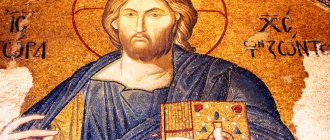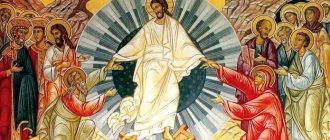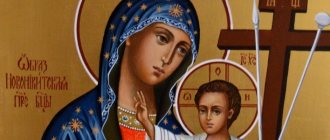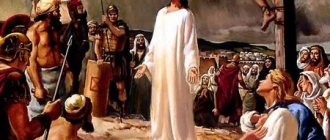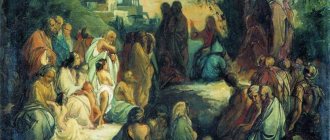Beginning with the Feast of the Entry of the Most Holy Theotokos into the Temple, the Church established the singing of the Irmos of the Christmas canon “Christ is Born” at Matins. Below is a translation of these chants into Russian.
| Nativity |
1. Christ is born, glorify: Christ is from heaven, rise: Christ is on earth, ascend. Sing to the Lord, all the earth, and sing with joy, O people, for you have been glorified.
Translation:
Christ is born - praise! Christ from heaven, welcome! Christ on earth, ascend! Sing to the Lord, all the earth, and sing with joy, O people: for He is glorified.
Recognize God’s love for you, be encouraged, fallen ones, and triumph, transporting your thoughts to heaven, which becomes accessible to you.
3. First of all, to the Son born incorruptible from the Father, and in the last century to the Virgin incarnate without seed, let us cry out to Christ God, our exalted horn, holy art thou, O Lord.
Translation:
Before the ages, from the Father to the incorruptible Son, and in the last (times) to the seedless incarnation of the Virgin, let us exclaim to Christ God: You who exalted our dignity, holy are You, Lord!
4. The rod from the root of Jesse and the flower from it, Christ, you grew from the Virgin, you came from the mountain of praise in the shaded thicket, incarnate from the unartful, immaterial and God. Glory to Your power, Lord.
Translation:
Christ, the branch from the root and the flower from it, you were born of the Virgin; from a mountain overshadowed by a thicket, you came, the all-praised one, incarnate from the womanless, immaterial and God. Glory to Your power, Lord!
From a mountain overshadowed by a thicket - from the Virgin.
5. God of peace, Father of bounties, You sent us the great counsel of Your Angel, the giver of peace. Thus, having been taught the wisdom of God towards the light, from the morning we glorify Thee, O Lover of Mankind.
Translation:
God of peace, Father of mercy, You have sent us an Angel (messenger) of Your great counsel, giving peace. Therefore, having been brought to the light of the knowledge of God, beginning our morning prayers at night, we praise You, Lover of Mankind.
6. From the womb of the baby Jonah, a sea beast vomited and adopted him: but the Word entered into the Virgin, and the flesh received, having passed on, preserved incorruptible: since it did not suffer corruption, preserve the One who gave birth unharmed.
Translation:
The sea beast spewed Jonah out of his womb like a baby, just as he had received him; and the Word, having inhabited the Virgin and taking flesh, was born, keeping Her intact; for It preserved the One who gave birth to Him from the corruption that Itself did not undergo.
7. The fathers were educated in piety, heedless of the evil command, not afraid of the fiery rebuke, but standing in the midst of the flames: God of the fathers, blessed art thou.
Translation:
The youths, brought up together in piety, despising the wicked command, were not afraid of the threat of fire, but, standing among the flames, sang: Blessed are You, God of the fathers.
8. Draw an image of the natural birth-giving miracle of the cave: it is not as if the young ones are burning, as if below the fire of the Divinity of the Virgin, in the lower depths, the womb. Thus let us sing in praise: may all creation bless the Lord and exalt it to all ages.
Translation:
The image of a supernatural miracle was presented by the dew-bearing cave; for she did not burn the young men whom she received, just as the fire of the Divinity, the womb of the Virgin, into which it descended. Therefore, triumphantly, let us sing: let all creation bless the Lord and exalt it to all ages.
Magnify, my soul, the Most Honest and Most Glorious of the hosts on high, the Virgin Most Pure Mother of God.
9. I see a strange and glorious sacrament: the sky is a den, the throne of the cherubim of the Virgin, the manger is a container, in which reclines the incontainable Christ God, Whom we magnify in praise.
Translation:
I see an extraordinary and incomprehensible mystery: the cave is the sky; Virgo is the throne of the Cherubim; the manger is the container in which the incontainable Christ God reclines. We glorify Him and magnify Him.
It is more convenient for us to love, as if we are comfortable with fear, in silence; for love, O Virgin, it is inconvenient to weave long-form songs. But, Mother, give me strength, as long as there is will.
Translation:
It would be more convenient for us to remain silent, as it does not expose us to fear; With love for You, Virgo, it is not easy to compose harmoniously composed songs. However, Mother, grant us as much strength as we have zeal.
The Nativity Fast has just begun, but the spirit of the holiday is already in the air. Starting from December 4, the day of the celebration of the Entry of the Mother of God into the temple, Christmas carols are already heard at the evening service. “Christ is born - glorify, Christ from Heaven - hide” - these words of the first Christmas irmos remind us of the nearness of Christmas. There are 8 irmos in total in the Christmas canon. We will tell you how each of the Irmos is translated, what it means and how it is sung on the “Thomas” website during the Nativity Fast in the series of materials “Irmos of the Nativity of Christ.”
Irmos is the first stanza of the canon. A canon is a liturgical singing genre. The Christmas canon consists of two ancient canons, the authors of which are two brothers, the great 8th century hymnographers Cosmas of Mayum and John of Damascus. This praise to the triumph of the Nativity of Christ will be heard throughout Lent until the holiday itself and every day throughout Christmas time until Epiphany Eve (January 18).
You can read more about the place of the canon in the evening service here.
Irmos of the canon of the Nativity of Christ with translation, notes and examples of performance
Irmos is a small introductory verse of each song of the canon, which repeats its main idea. Irmoses remind believers of Old Testament times and events from the history of our salvation and gradually bring us closer to the event of the Nativity of Christ. They connect biblical songs that are not related to the event being celebrated, and troparia dedicated exclusively to the holiday. They also serve as a model of melody and rhythmic structure for troparions.
Song 1.
Song 3
First of all, to the Son born incorruptibly from the Father, / and in the last century, from the Virgin, / incarnate without seed, / Let us cry out to Christ God: / Our exalted horn, / Thou art holy, O Lord.
Song 4
Song 5
Song 6
From the womb of the baby Jonah the sea beast vomited, / he was adopted, / the Word entered into the Virgin, / and the flesh that was received passed on, preserving it incorruptible. / Because it did not suffer from decay, / Keep the one who gave birth unharmed.
Song 7
The youths, educated in piety, / did not heed the evil command, / did not fear the fiery rebuke, / but, standing in the midst of the flames, they belted: / God of the fathers, blessed art thou.
Song 8
The miracle of the supernatural / dew-bearing cave depicts the image: / not more than it is accepted, scorches the young ones, / like below the fire of the Virgin’s Divinity, / in Nyuzha the womb entered. / Thus praising, let us sing: / may all creation bless the Lord / and exalt it to all ages.
Song 9
I see a strange and glorious sacrament: / The sky is a den, the Throne of the Cherubim is the Virgin, / the manger is a container, / in which reclines the Inconceivable One - Christ God, / Whom we magnify in praise.
Song canon
Nativity.
Miniature Minology of Vasily II. Constantinople. 985 Vatican Library. Rome. Image from the site pravoslavie.ru In fact, there is not one, but two Christmas canons: both were composed in the 8th century by two great church poets and hymnographers: Cosmas of Mayum and his brother John of Damascus.
The Irmos of the first canon (Cosmas of Mayum) are performed every Saturday, starting from the day of the celebration of the Entry into the Temple of the Blessed Virgin Mary (December 4, according to the New Style) until Christmas, and every day throughout Christmas time until Epiphany Eve (December 18): this is how the connection between the event of the Entry is expressed - the beginning of the preparation of the Mother of God for Her future mission - and the birth of the Savior.
In liturgical monuments of the 5th-8th centuries, the word “canon” refers to selected texts for reading and singing at church services. In the 7th century, a new liturgical genre began to take shape in the Church: the singing canon - a specific rule for singing hymns from the Holy Scriptures.
The singing canon consists of nine biblical hymns (songs in Slavic) combined with troparia (from the Greek “tropos” - “figure of speech”) - poetic texts in which the ideas of each hymn are supplemented and developed in accordance with the theme of the holiday. The combination of a biblical hymn with troparia is called the “song of the canon.”
In each of the nine songs of the canon, the connection with the text of the biblical hymn is made by the initial (main) troparion of the song - irmos, which serves as a model for the performance of the remaining troparions of the canon. It is the irmos (in Greek “plexus”, “ligament”) that links the content of the hymn with the subsequent troparions.
Translation into Russian
Song 1
Christ is born - praise! / Christ from heaven - welcome! / Christ on earth - arise! / Sing to the Lord, all the earth, / and sing with joy, O people, / for He is glorified!
Song 3
Before the ages, born from the Father / not according to earthly laws to the Son / and in recent times from the Virgin / incarnate without a seed, / let us cry to Christ God: / “He who has exalted our dignity, / holy are You, Lord!”
Song 4
Song 5
You, God of peace and Father of mercy, / have sent us the Messenger of Your great plan, / giving us peace. / Therefore, brought to the light of the knowledge of God, / welcoming the dawn after the night, / we praise You, Lover of Mankind.
Song 6
The sea beast cast Jonah out of his womb as a baby, just as he had received him; / and the Word, having inhabited the Virgin and taken on flesh, / passed through Her, preserving Her incorruptible; / after all, just as He Himself did not undergo the usual conception, / so He kept the One who gave birth unharmed.
Song 7
Song 8
The dew-sprinkling furnace / presented an image of a supernatural miracle: / for it does not scorch the young men whom it received into itself, / just as the fire of the Divinity of the Virgin’s womb / into which it descended. / Therefore, let us sing a song: / “May the Lord bless all creation / and exalt it to all ages!”
Song 9
I see a mystery / extraordinary and wonderful: / the cave is the sky, the throne of the Cherubim is the Virgin, / the manger is the container, / where the incontainable Christ God lies down, / whom we magnify in songs.
Christ is born! Praise!
Seeing the Creator of the destruction of man... who he created, bowing the heavens, descends... From the Canon of the Nativity of the Lord God and our Savior Jesus Christ
The circle of summer calmly and inexorably moves through life by God’s command, and reminders of Divine love—the feasts of the Lord—flare up in it like a bright star. And now it’s Christmas! Let us all come now and bow down to the humble manger, illuminated by Divine glory, for here the Infant Christ begins His way of the cross across the face of the earth. Let us bow down, for here is the beginning of our salvation, the beginning of our eternity. The Way, the Truth and the Life—Christ God appeared into the world. And the Infant God brought His peace to earth, and God’s peace was given to people by Christ the Savior through the feat of His short earthly life. But through the feat of our faith this world of God—Divine love and Divine mercy—enters into our lives. And is it not because our faith has become exhausted that two opposite images now appear in a troubled world awaiting disasters - the image of God’s desecrated love and the triumphant laughter of the devil’s malice? And is it not this enemy’s malice that is now tearing out from among the Church those who are impoverished in love, and brother ceases to understand brother, and the son forgets his father, and the image of God’s desecrated love heralds death. Our friends, let us be afraid of the vision, let us approach the Infant Christ in repentance and supplication, pouring out quiet prayers before Him. And He, our Lord and God, will enlighten, and renew, and save us all, who have fallen to Him in distress. Today is the Nativity of Christ, the day of the beginning of the feat of the Savior of the world. Today is the day of testing our love and fidelity to Him. And let the world hear the truth proclaimed by our life: “God is with us, understand the Gentiles... as God is with us!” We congratulate you all with the joy of the greatest holiday of the Nativity of Christ! God the Lord Christ appeared into the world as a baby, wrapped in swaddling clothes. And the Virgin Mother bent over Him in amazement at the immensity of the mystery revealed to the world. And the Mother of the Immaculate Virgin Mary, who served the “great piety of the mystery,” at that moment knew the full height of joy, because Man and God appeared into the world. And only She knew this so far. And She alone, at that very moment, tremblingly foresaw the full depth of the grief of the Way of the Cross, which she was now embarking on with the Baby in her arms. And today is the day of worthy veneration of the Mother of God, the Immaculate Virgin Mary, who served the mystery of the incarnation of the Son of God. Few words are said about Her in the Holy Scriptures, few events of Her personal life have been preserved by Tradition. But behind every step of Her Divine Son She visibly stands, starting from His birth and ending with the Cross on Calvary. And it is not difficult for us to imagine the greatness of Her exceptional maternal feat for humanity, but it is more difficult to comprehend that highest degree of purity and holiness, complete devotion to the will of God, which made Her “the dawn of the mysterious day” and with which She entered into intimacy with the Most Essential Trinity, becoming a Daughter God the Father, Mother the Son of God and Bride the Holy Spirit. God’s promise, given to the first people, that the time would come and the Savior of the world would be born on earth and “the seed of the woman would erase the head of the serpent”—the devil—did not suddenly come true. Humanity went through a long path of preparatory purification and sanctification, until finally the God-chosen Maiden appeared, and the Angels sang a divine hymn to the Incarnate, the heavens heralded the great event with a wonderful star, the earth provided a cave, and the human race gave the Virgin Mother, who fulfilled the Divine Council of the Most High God. And the freedom from sin that the Ever-Virgin achieved was, first of all, a great gift from God and Her personal feat of love for God. For Her heart from infancy was always turned to Him. And the vow of Her parents, given at the birth of the Daughter, to dedicate Her to God, became the vow of Her heart. And the feat of Her life was nourished by the prayers of Her parents, the prayers and aspirations of all Old Testament humanity, the entire host of patriarchs and righteous people. And the purpose of the incarnation of the Son of God is the revival and renewal of the world, the elimination from it of all the consequences of the Fall, the restoration of the pristine Kingdom of God. And the Blessed Virgin served this great purpose. Through her feat of life, prayer and love, we have gained eternal salvation. And “God (now) is called our Father, because the Word has partaken of our flesh, for the Son makes His Father become our Father,” as St. Athanasius of Alexandria says. And the will of Her Divine Son and Savior of the world adopted the entire human race of the Mother of God. We gain such truly immeasurable wealth through faith, we receive such an invaluable gift - Father and Mother. And how can one not exclaim from the depths of believing hearts songs of praise and hymns to the Mother of God, the Most Holy and Immaculate Virgin Mary: “Rejoice, light of human salvation, morning of grace, evening of sin, the original ray of a happy day, the mirror of holiness, the hidden image of perfection, the complete ideal of virginity . Rejoice, fulfillment of prophecies, the common aspiration of the people to whom You have brought joy.” O Bogomati! O All-Singing One! O Lady! Let everyone who calls You reach the eternal day with You and worship You face to face. Amen. Prayer to the Mother of God What should I pray to You for, what should I ask of You? You see everything, you know everything. Look into my soul yourself and give it what it needs. You, who have endured everything, overcome everything, will understand everything. You, who entwined the Baby in a manger and took Him with Your hands from the Cross, You alone know all the heights of joy, all the oppression of grief. You, who have received the entire human race as adoption, look at me with maternal care. From the snares of sin, lead me to Your Son. I see a tear watering Your face. It is above me that you shed it, and let it wash away the traces of my sins. So I have come, I stand and wait for Your response. O Bogomati! O All-Singing One! O Lady! I don’t ask for anything, I just stand before You. Only my heart, a poor human heart, exhausted in longing for truth, I throw at Your most pure feet, Lady! Grant to all who call You to reach the eternal day by You and worship You face to face. First published: https://www.pskovo-pechersky-monastery.ru/
Irmos of the Nativity - sheet music pdf format
Irmos of the first canon of the Nativity of Christ by Dvoretsky for male trio
Irmos of the first canon of the Nativity of Christ by Dmitry Allemanov for male choir
Irmos of the first canon of the Nativity of Christ by Dmitry Allemanov
Irmos of the first canon of the Nativity of Christ by A. Arkhangelsky
Irmos of the first canon of the Nativity of Christ by P. Ivanov-Radkevich
Irmos of the first canon for the Nativity of Christ, Greek chant, arranged by Archimandrite Theophan
Irmos of the first canon for the Nativity of Christ, Greek chant
Irmos of the first canon for the Nativity of Christ by Sergei Ryabchenko
Irmos of the Nativity of Christ by S. Tolstokulakova for incomplete mixed choir
Irmos of the Nativity of Christ S. Tolstokulakova
Irmos of the second canon of the Nativity of Christ by A. Kastalsky
Irmos of the second canon of the Nativity of Christ A. Lvov
Irmos of the second canon of the Nativity of Christ, Greek chant
Irmos of the second canon of the Nativity of Christ, everyday chant
Irmos of the canon of the Nativity of Christ, 6-voice, music. Samusenko S.
Irmos of the canon of the Nativity of Christ. Text
Christmas chaos
Adoration of the Magi.
Fragment of the icon of the Nativity of Christ, 16th century. Russia. Image from the website: https://pravzhizn.com/ When, over time, the singing canon was finally established in liturgical use, the irmos of some holiday canons formed an independent genre - katavasia. “Katavasia” (from the Greek “katabasis” - “descent down”) is the name given to groups of irmos of some festive canons, for the solemn performance of which at the end of each song of the canon, the singers of both church choirs (right and left choir) left their places and united into one choir in the middle of the temple. Of course, now such a unification of choirs in parish churches occurs infrequently.
Canon of the Nativity of the Blessed Virgin Mary
Irmos: Come, people, let us sing a song to Christ God, who divided the sea, and taught the people, even as he learned from the work of Egypt, for he was glorified.
Come faithfully, rejoicing in the Divine Spirit, Who has come today from the barren days to save people, Let us honor the Ever-Virgin Youth with songs.
Rejoice, Pure One, Mother and servant of Christ God, even the First Intercessor of bliss, the human race, we all worthily glorify You with songs.
The Bridge of Life is born today, Through which men have found the cry of the fall from hell, and glorify Christ the Giver of Life with songs.
Irmos: Establish us in Thee, O Lord, by the tree of mortification of sin, and plant Thy fear in the hearts of us who sing Thee.
Having lived immaculately to God, begotten of Salvation of all, the parent of God's wisdom, the Creator of the Birth and our God.
The Lord exuded life to everyone, from the barren birth of the Virgin, he willed to dwell in Nyuzha, and after Christmas he remained incorruptible.
Anna's fruit, Mary, today, who gave birth to the life-giving grape, as the Mother of God we sing, the Representative of all and the Helper.
Sedalen, voice 4
The Virgin Mary and Mother of God truly, like a cloud of light has risen for us today, and from the righteous it will come to our glory. Adam is not condemned to anyone, and Eve is freed from her bonds, and for this sake we cry out loudly with boldness to the One Pure One: joy proclaims Your Nativity to the whole universe.
Irmos: O Lord, I have heard the hearing of Your gaze, and glorified You, the only One who loves mankind.
We sing praises to You, Lord, who gave the faithful a saving Shelter to all, who gave birth to You.
You are the Bride of God, Christ show praise and power to all who sing Your sacrament faithfully.
Unartful Lady, with Your prayers we deliver from sins, we prudently please You all.
Irmos: Having destroyed the hay-written darkness of fortune-telling, and having illuminated the hearts of the faithful with the arrival of truth, the Virgin of God, and instruct us with Thy light, Christ.
Let us sing to the people of all the Guilt that exists for us to be Guilty: Even though the prophets rejoiced in the image, the revealed salvation from Him is fruitful.
From the dry vegetation of the priest's rod, Israel was shown prophecy: and now the lordship of those who vegetated gloriously shines, from the barrenness the all-glorious Birth.
Irmos: Jonah cry out to the Lord from the whale: You bring me up from the depths of hell, I pray, so that as a Deliverer, in a voice of praise, I will devour the truth to You in spirit.
The parents cried out to the Lord in the sorrow of barrenness, the Mother of God of Godly Wisdom, and gave birth to this throughout the generations, for common salvation and praise.
I have received the heavenly Gift from God, worthy of the Mother of God of Godly Wisdom, parents, Samech of the Cherubim who exceeded the Bearer, the Word and the Creator of the Parent.
Irmos 1: Christ is born!
The Christmas chaos consists of the irmos of the canon of St. Cosmas of Mayum. The author was inspired to write it by the festive sermon of St. Gregory the Theologian - “A Word on Epiphany, or on the Nativity of the Savior” (until the beginning of the 5th century, the events of the Nativity and Baptism of Christ in the Christian Church constituted one feast of Epiphany). The poetic beginning of this Word became the irmos of the first song of the canon:
Christ is born, glorify: Christ from heaven, hide: Christ is on earth, be exalted: sing to the Lord, all the earth, and people sing with joy, for you have been glorified.
(translation)
Christ is born - praise! Christ (coming) from heaven - welcome! Christ on earth - ascend (to heaven)! Sing to the Lord, all the earth! O people, sing (to Him) with joy, for He is glorified.
According to the law of the genre, the irmos of each song of the canon must be thematically connected with the poetics of the corresponding song of the Holy Scripture. The first biblical song is considered to be the victory hymn of the prophet Moses “We sing to the Lord, gloriously we will be glorified...” (see Ex. 15: 1-19). The connecting link of the first irmos is the last verse “for he was glorified,” coinciding with the supreme image of the prophetic hymn of Moses - the Lord of glory, who once delivered His people from Egyptian slavery. Now the Lord incarnates with glory (born as the God-man) in order to deliver all humanity from slavery to sin.
Second Bible Hymn
- the accusatory song of Moses from the book of Deuteronomy (about God’s faithfulness to His Covenant in the “days of old” and the infidelity of Israel, entailing retribution (see 32: 1-43) - is included in the songs of the canon only during the periods of Great Lent and Pentecost, and the rest of the time the canon consists of eight songs: 1, 3-9.
Irmos 4: Glorification of the Mother of God who gave birth to Christ
Habakkuk's prophecy about the Mother of God as the Mountain of God, overshadowed by grace from above (see Hab. 3: 2-19), is embodied in the poetics of the irmos of the fourth song (Jesse is the father of King David, the ancestor of the Mother of God):
The rod from the root of Jesse, and the flower from it, Christ, from the Virgin, you grew green, from the mountain of praise, the shaded thicket, you came to be incarnate from the unartful, immaterial and God. Glory to Your power, Lord.
(translation)
Christ, You are a branch from the root of Jesse and a flower from him! Glorified One, You grew from the Virgin - from the mountain, overshadowed by the coolness of the forest thicket. You, the incorporeal God, came (to us), having become incarnate from a woman who did not know a husband (Mary). Lord, glory to Your power!
Irmos 5: Peace on earth, love in people
According to the teachings of the Church, the message to fallen humanity of Christ the Savior, reconciling sinful man with the Holy God, was predetermined at the pre-eternal (held before the beginning of the world) Council of the Holy Trinity. That is why in the prophecy of Isaiah Christ is called the Member of the Council and the Chief of Reconciliation (see Isa. 9: 6).
The fifth biblical hymn is taken from the same book of Isaiah (see 26: 9-20), in which the prophet from the depths of the darkness of the night (a symbol of the human world of evil and sin) welcomes the coming dawn as an image of the coming of Christ, giving people peace with their Creator and light knowledge of the true God the Father:
God of peace, Father of bounties, You have sent us the gift of great counsel from Your Angel: Thus, having been taught the wisdom of God towards the light, from the morning in the morning, we glorify You, O Lover of Mankind.
(translation)
As the God of reconciliation and the Father of compassion, You have sent us the Angel (Messenger) of Your great Council, giving peace [i.e. e. reconciliation]. And we, brought (by Him) to the light of knowledge of God, awake from (deep) night, praise You, O Lover of Mankind.


